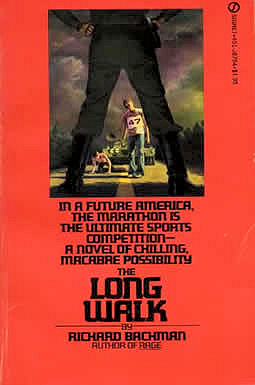
Richard Bachman, you crazy kidder. You should have started with The Long Walk! Stephen King's alter ego's sophomore effort is a blood bath set in a horrible seventies dystopia, but it's not inhuman. It is the first of Bachman's novels about deadly competitions, and one that has firmly influenced future generations of writers of nightmare dystopias — in a far more positive way than Rage ever inspired anyone. The Long Walk is Bachman's first good novel and, chronologically, the first novel that King ever wrote. Sometimes things just don't happen in order.
In an alternate America, the Long Walk is a yearly event in which 100 teenage boys must walk a trail at 4 miles per hour until there is only one man standing. Anyone who dips below the speed limit gets shot and killed after their third warning. The Long Walk follows #47, Ray Garraty, as he participates for the Prize: anything he wants for the rest of his life.
Without the death penalty, the Long Walk doesn't sound too bad until you look up footage of people maintaining a four mile per hour speed. 4mph is difficult for distance and endurance, especially with no breaks of any kind — toilet, sleep, or meal. After a point, endurance gives way to torture, and that's what King is saying in The Long Walk: the sort of people who enjoy watching teens compete to the death coagulate into a loathsome crowd of voyeurs, hooters, and hollerers. It's one thing to read a novel about teens in an elaborate death contest, and quite another for that thing to be real; it's exactly the same as one being able to enjoy the Rocky movies while not being able to watch a real boxing match.
The Long Walk does not burden its reader with details: we never learn how the Long Walk got started, why the Major who runs it has so much power and charisma, or why someone would participate in a competition with such a low chance of victory and such a steep penalty for failure. The Long Walk is a voluntary endeavour: while there's a lottery element to it, you have to enlist to be considered. The reader is left to fill in the blanks themselves, and the glimpses that we get of the society that gave rise to the Walk — and the cultural and political touchstones that linger from our own continuity — are the fascinating backbone of the novel.
Just as the Walk wears down the walkers, so too does King wear down his reader. Most of the deaths on the road you simply can't care about: there are too many of them and the participants are more often numbers rather than characters. In the dying stages of the competition, however, when the Walk is down to the last few, and everyone has been awake and on their feet for five solid days, the deaths are significant and suddenly become affecting. King's prose comes to a head as the novel does, providing an ending that has more impact than the rest of the novel up to that point.
The Long Walk is a cumulative experience, and it lands hard. The only problem — and it's not on King's end — is that The Long Walk has such a distinctive ending that it may have already seeped into the reader's cultural subconscious. It would be a stretch to say that it's a conclusion comparable to some of F. Scott Fitzgerald's most iconic work, but what is literary criticism for if not the stretch? The Long Walk is solid throughout, but it really sells itself in the last five pages.
The Long Walk is an iconic title in the Bachman catalogue, and one that deserves to have King's name on it. While it may not have the name recognition of Bachman's other competition/game show dystopia, The Running Man, The Long Walk's influencehas almost as far a reach. The Walkhas been adapted into a non-fatal and more humane real life version in Sweden; maybe you don't want to go over there and participate but, once you've read The Long Walk, you will carry it with you whenever your feet are killing you but you have no choice but to carry on.


